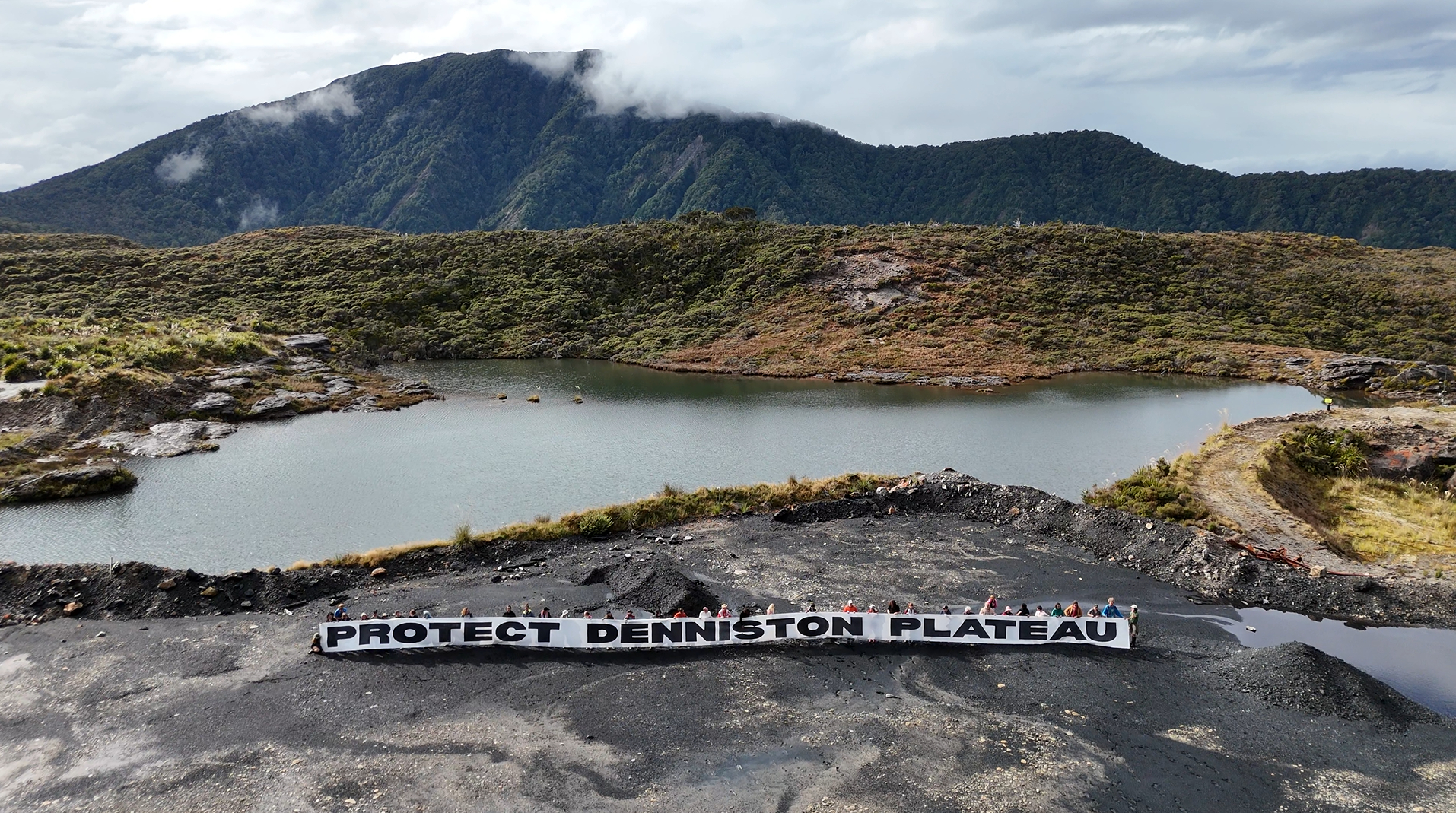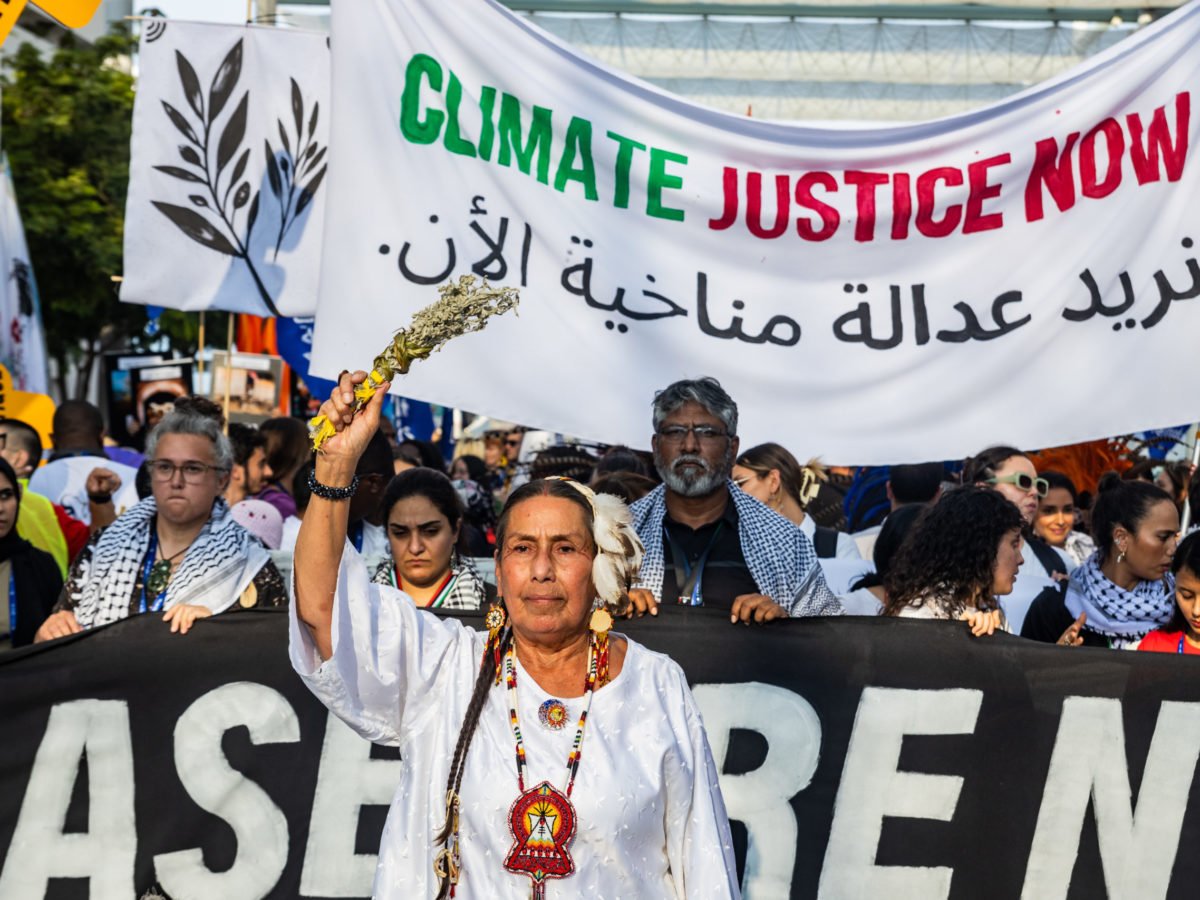With Trump out of the White House, it seems like there is a return to normality in international media. But this normality hides the existential dread of climate change. The emissions targets set in the Kyoto Protocol in 1997 were abandoned when they were supposed to come into force in 2005. Governments around the world have shifted the goalposts to zero-emissions by 2050. In reality, those in power are sacrificing the future by not implementing climate change policies that might actually challenge capitalist interests.
The scenario presented to us from these capitalist governments is that the best we can do is accept the target of 1.5 degrees of warming since pre-industrial times. This is the target of the 2015 Paris Agreement. Yet six years after the Paris accords the world is nowhere near being on track to limiting the temperature increase. Instead many experts’ projections are for much higher temperatures and a dystopian hothouse Earth of agricultural loss, collapse of ecosystems and rising sea levels.
The criminal lack of action is due to the world being dominated by a capitalist ruling class. Even where states have social-democratic government, like New Zealand, their politics are subordinate to an acceptance of capitalism. The Communist police states of China, Cuba etc. are state-capitalist systems that are locked into world market competition.
The Intergovernmental Panel on Climate Change’s (IPCC) prediction of a warming world is already here wit worrying signs of positive feedback loops in the global climate system begging to activate.The perpetual worry is that even with complete zero carbon emissions by 2050, human society must draw down the carbon already emitted to the atmosphere. The assumption is that this will be done by technology that has not been invented yet, let alone at a scale large enough to have an effect.
We are all very aware of the enormity of this crisis and that the solutions put forward are frighteningly slow and inadequate. We need to take account of the timescale and make sure that we are not putting our dreams of a liveable future in false hopes. Governments have been focused on electrifying vehicle fleets and monetising forests for carbon capture, NGO’s have long said that we need to make individual consumer choices and buy the right products. All of these presentations assume business as usual, and that green capitalism, renewable energy and new technologies will save us. In reality the disconnectedness between humankind and the environment is not because of technology or individual human greed, but rather the structure of our economy and society, namely capitalism.
Alienated from nature
Our disconnectedness from nature is not a new philosophical question, it has developed over centuries from the beginning of capitalism. In fact, alienation and the separation of people from the world around them is the fundamental philosophical basis upon which Karl Marx created his critique of capitalism. The metabolic rift is a term derived from Karl Marx’s description of the fundamental shift in the relationship between our species and the rest of nature which developed alongside capitalism. It is this rift that asserts itself as climate change and it is irrevocably tied to how capitalist property relations work. Marx’s starting point for his economic analysis was that humans, along with all living things, have a relationship to the earth. At the most basic level, without clean air, water and a stable food supply, humans cannot survive on the planet.
In Marx’s later work he describes more concretely how capitalist society had created a break or rift in this metabolism between humans and nature. Capitalism’s logic of profit before all else would set it on a collision course with the natural world on a scale unknown before in human history. In Volume 3 of Capital Marx explained how capitalism
…Reduces the agricultural population to an ever decreasing minimum and confronts it with an ever growing industrial population crammed together in large towns; in this way it produces conditions that provoke an irreparable rift in the interdependent process of social metabolism, a metabolism prescribed by the natural laws of life itself. The result of this is a squandering of the vitality of the soil, which is carried by trade far beyond the bounds of a single country.
Marx and Engels’ analysis led them to understand that while capitalism is the most dynamic human society created, it is also the most destructive. Rather than human need or environmental sustainability, competition for the sake of accumulation and profit-making is the key motive force of the system. Environmental destruction has been a key consequence of this capitalist logic from its beginnings in Europe through to today. Using this analysis of capitalism, we can look at the avenues in front of us to deal with climate change to judge what we should support to create a liveable future.
The inadequacy of current action
Current efforts to stop climate change are woefully insufficient. While 196 countries are party to the Paris Agreement, the agreement itself is pitiful. Under the agreement each country must plan its own contributions to mitigate warming. However, no mechanism forces countries to set a specific target, nor are there any consequences for not meeting these goals. Leaders of capitalist nations around the world are searching for policies that will not disrupt the sections of capital that are heavily involved in resource extraction. As such they rely on electric vehicles, planting trees, swapping carbon credits and illusory scientific projects such as carbon capture technologies.
These illusory carbon capture technologies feature heavily in the IPCC’s estimations. One such mechanism is called BECCS (bioenergy and carbon capture storage). Essentially using trees to capture carbon dioxide and then burying them in the ground. But this requires vast tracts of plantations to do this with the IPCC estimating in their latest report that between 20-50 percent of the arable land on the planet would be required to take this up. In order to offset the New Zealand air travel emissions alone since 2005 alone, a study by Inga Smith and Craig Rodger of the University of Otago estimated that 33 Rakiura (Stewart Island) areas of land would need to be planted – and that is just air travel.
NGO’s like Greenpeace also advocate for legal restraints and ending fossil fuel extraction, and encourage us to make individual consumer choices to change society. This too, exists only within this paradigm of not upsetting property rights as individual action is sporadic and ill-defined. We can only purchase what is produced and individualism alienates and separates people from collective action. Why should we as individuals make sacrifices when the Carbon Disclosure Project reported that “100 active fossil fuel producers including ExxonMobil, Shell, BHP Billiton and Gazprom are linked to 71% of industrial greenhouse gas emissions since 1988.”
Climate change policies that avoid direct government intervention and rely on the market, like consumer behaviour and emissions trading schemes, trade the issue of emissions for another environmental issue. None of these policies will effectively transition our society to a zero-carbon economy, but under the logic of capitalism these are the only policies acceptable because they do not impinge upon property rights.
Of course, carbon dioxide emissions are not the only issue. The myopic focus on this allows countries to avoid criticisms about the other issues of environmental degradation such as pollution, biodiversity loss, deforestation, soil degradation, overfishing and persistent organic pollutants. It is these other issues that are key to understanding the metabolic rift – the separation between human society and nature – that Marx outlined in his analysis of capitalism. And also why under a capitalist system these issues are insurmountable without challenging property rights and the basis of the economic system itself.
The real solutions
There are real possible alternatives that are being practiced today that can, when combined with a holistic view of our economy, avoid a dystopian future. Many of these low tech policies focus on our interaction with nature and our methods of agriculture and fishing. Policies such as regenerative farming enrich the soil and increase biodiversity. Herd animals can be used to redevelop vast swathes of land through redistributing nutrients. Rewilding areas of the planet can stave off biodiversity loss. The enforcement of no fish areas can restore the marine ecology.
All these and other measures require a holistic approach that must be based on the rational implementation of ecological science. But the capitalist system is unable to approach a relationship with nature as anything other than a source of commodities to exploit. To effectively draw down carbon dioxide levels the environmental movement will have to fight for control over the arable land and the implementation of technology and practices. One of the movement’s greatest tasks is to create an internationalist movement that can rationally apply such technologies globally, but under the current system of nation states and capitalist governments there are inter-imperialist rivalries, with the danger of climate wars on the horizon.
Real possible alternatives that heal the metabolic rift, as Marx described it, are not just possible but clear cut. But these effective measures are not implemented because they would disrupt property rights and call into question the relationships between classes under capitalism. Fundamental change to deal with the climate crisis requires those relationships between workers and bosses to be done away with.
Reckoning with a colonial history
Many of these proposals come from scientists analysing how indigenous societies have managed the environments they found themselves in. Societies that had never known the concept of private property until colonisation are now at the forefront of the fight against climate change. Indigenous cultures around the world have a deep respect for the ecosystems that they live in and how they have been ravaged at the hands of capitalism. The history of colonisation cannot be separated from capitalism and can be understood fundamentally to be about breaking up the relationship between land and its people. From the enclosing of the commons in Britain to the colonisation of Aotearoa, these actions have been to secure individual ownership of land and thus the establishment of capitalist relationships of production between workers and owners.
In te ao Māori you do not own the land, the land owns you. You belong to it and are born from it. You come from Papatuanuku, the Earth Mother. This concept abounds throughout indigenous societies around the world that only knew communal ownership of land. It was the first target of colonisation to claim the land under individual title so that it could become natural capital for resource extraction and, in New Zealand, dispossess Maori so that they could become a cheap labour force working on the land for profit extraction. This same process underpins colonisation wherever it has taken place – disruption of the previous relationships between humans and nature impose rule by the bourgeois class by any means necessary: swindling, enslavement and genocide.
In reckoning with New Zealand’s colonial past we can lay the basis for an environmental movement that rejects private property ownership and the idea that the land is a commodity to be bought, sold and exploited. It is in this spirit that land occupations from Shelly Bay to Ihumātao represent the front line of indigenous collective action to reclaim the land. That spirit of collective action and collective ownership is anathema to the property relations that capitalism is built upon. It is necessary to understand the past because it tells us that it is not human nature that dictates our relationship to nature, but the structure of our society. It reminds us that capitalism is not inevitable, that another world is possible.
Have imagination, create a better world
The current environmental movement struggles to envision solutions because of its assumption of the permanence of capitalism, but in that case there will be mass climate crisis deaths in the future as a direct result of capitalism’s barbaric priorities. However, techniques to adapt to climate change are available and relatively straight forward with the technology that already exists. For example, conservation of water supplies through recycling systems in urban centres and industry. The story is similar for more efficient food production. Land can be better used by reducing herd sizes and regeneration of the soils. A holistic approach is required that transcends the private property ideology that “it is my land I can do what I want with it.”
Beyond adaption, there are simple solutions to the climate crisis. Cities could be re-designed to be carbon neutral and harmonise with the natural environment. Deforestation could be reversed by managed rewilding with native vegetation. Waterways could be restored to abound with wildlife again. If necessary, mass migrations, internally or from overseas, could be accommodated. These ideas are common sense and are not in themselves socialist. However, where socialism comes in is with actually achieving a society where these solutions can be applied. We have to do away with the economic system of capitalism.
Hunger and a lack of clean water continue to exist, not because of climate change but because of the interest of agribusiness and imperialist nation states that put profit and power before human need. A socialist society is predicated on a simple slogan – production for human need. We need to end capitalism to ensure that our planet can continue to be habitable not just for us but for the rest of the biosphere. The only thing stopping us from having a future is capitalism itself.









